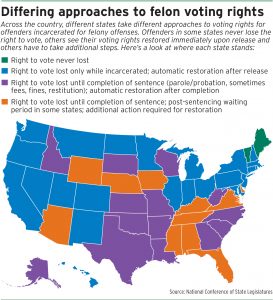Subscriber Benefit
As a subscriber you can listen to articles at work, in the car, or while you work out. Subscribe NowTo be able to vote in a primary or general election is one of the most fundamental rights an American can exercise.
In most states, that right is taken away when a person is convicted of a felony. But some states, including Indiana, automatically restore voting rights upon release from incarceration.
But that doesn’t mean everyone with a felony conviction understands that their voting rights have been restored upon release, or what they need to do to register for the next election.

Voting rights advocates like Ami Gandhi want to be sure they do understand.
Gandhi, who is based in Bloomington, is the Chicago Lawyers’ Committee for Civil Rights’ director of strategic initiatives and Midwest voting rights programs. Her voting rights work for the nonpartisan civil rights advocacy group is centered in Illinois and Indiana.
Gandhi said every election, her office receives calls from people who have been released from incarceration, or who have friends or family members who have been released, and are confused about their voter eligibility. Voter registration and the laws surrounding it can be mystifying to people, she said, whether they are registering after being released from incarceration or not.
“We work hard to clear up any misconceptions in questions people may have,” Gandhi said.
 Indiana efforts
Indiana efforts
The Sentencing Project released a report in October, “Expanding the Vote: State Felony Disenfranchisement Reform,” which provides a closer look nationally, state by state, at changes to voting rights for people with felony convictions and measures the impact of those changes.
According to the report, more than 2 million Americans have regained the right to vote since 1997. Also, the number of people “disenfranchised” due to a felony conviction has reduced by 24% since peaking in 2016.
A 2022 report also from The Sentencing Project estimated that 4.6 million Americans were barred from voting due to a felony conviction, including 23,944 Indiana residents in prison at the time and 1,857 in jail.
In Indiana, anyone who is convicted of a felony or a misdemeanor and is incarcerated loses their right to vote. Upon release, they may register to vote and cast a ballot, according to the American Civil Liberties Union of Indiana. People who have been previously incarcerated should check their registration and reregister to vote if it has been canceled.
Individuals on parole, probation, home detention or people who are in jail awaiting trial can vote. People who are in a community corrections program, such as work release or electronic monitoring, can also vote.

Katie Blair, the ACLU of Indiana’s director of advocacy and public policy, pointed to the organization’s “Yes! You Can Vote!” campaign, which provides outreach and voting information to several groups, including Indiana residents who were previously incarcerated, are on parole, probation or home detention, or are in jail awaiting trial.
“It’s aimed at educating people on their rights to vote,” Blair said.
The ACLU of Indiana partners with a number of organizations that work with previously incarcerated individuals and distributes organizational materials to reentry organizations. It also runs voting rights ads on social media, television, city buses and billboard space.
“The only people that have pushed back at us are some people who have a hard time believing these rights even exist,” Blair said.
Spreading the word
Blair said the ACLU is part of a coalition of partners focused on issues such as voting rights related to reentry and reintegrating previously incarcerated people back into the community.
In terms of education for people incarcerated in county jails, education on the restoration of voting rights varies from county to county in Indiana, Blair said.
She said there is a lot of misinformation circulating that frightens some people into thinking they can’t vote once they’re released from incarceration.
The ACLU, she said, “didn’t just start this work from nothing” and had responded to phone calls and questions from people who had genuine concerns about whether they could legally vote.
“So it’s critically important that folks that have any question about their right to vote have the materials they need to inform them,” Blair said.

Julia Vaughn, executive director of Common Cause Indiana, also said there are a lot of misconceptions about felony disenfranchisement and voting reinfranchisement in Indiana.
“I think most people don’t know that they have the right to vote,” Vaughn said.
Vaughn also noted that a lot of states now restore voting rights to people with felony convictions upon their release. She cited Minnesota as one of the more recent states to pass legislation for voting rights restoration.
Vaughn said she thinks Indiana, through its Department of Correction, could do more to let incarcerated people with felony convictions know that their voting rights will be restored upon release, as well as what they need to do to update their voter registration.
“The state should be more proactive so that those folks understand what their rights and what their responsibilities are,” she said.
Gregory Dunn, an Indiana DOC spokesperson, told Indiana Lawyer in an email that voter registration is a part of the IDOC’s pre-release course.
During the course, electoral district residency and state ID requirements are discussed in the curriculum, Dunn said. Voter registration is also discussed by parole agents during a parolee’s initial interview upon release.
Pre-release programs vary for each incarcerated individual and can begin up to six months before their release. The programs are specifically tailored to the individual with the help of their case manager, Dunn said, and they can cover a wide range of topics including obtaining essential documents such as state IDs, Social Security cards and birth certificates; helping with life skills such as health and wellness, stress management, family dynamics and substances abuse; and education about community resources that will be available upon release.
Incarceration efforts
Gandhi said government leaders, including those in corrections agencies, can absolutely do more to put information into the hands of eligible voters.
She gave the example of the Cook County Jail in Chicago, which now provides in-person polling places for inmates in pretrial detention who are eligible to vote.
Both Gandhi and Vaughn opined that defendants who are in jail pretrial might not be aware that they can still cast their ballots.
While Vaughn said she hasn’t seen any statistics on how many people with felony convictions actually vote once they are released, she thinks the percentage is probably pretty low. She agreed with Blair that what county jails do in terms of educating prisoners about their voting rights varies.
For example, Vaughn previously worked in Spencer County as a contractor with the Governor’s Council for People with Disabilities. She recalled a sheriff who was very proactive in letting prisoners in pretrial detention know they had the right to vote by mail.
But turnout rates alone may not accurately reflect civic participation attempts among people who have been released from prison, Gandhi said.
She also pointed to a 2019 Brennan Center for Law report titled “Restoring The Right to Vote,” which included a policy recommendation that restoration of voting rights legislation ensure that “criminal defendants are informed before conviction and sentencing to prison, that they will lose their voting rights; and upon release from prison and/or release to community supervision, that they are again eligible to register and vote.”•
Please enable JavaScript to view this content.
